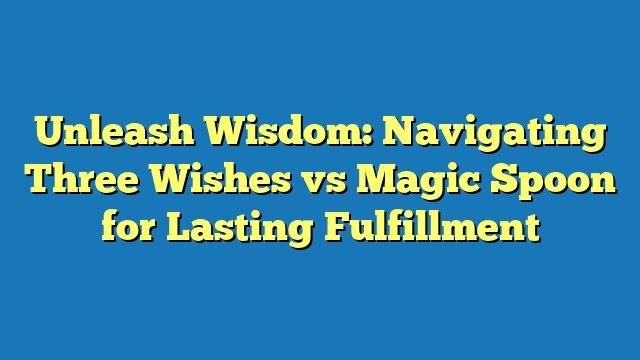The “three wishes vs magic spoon” concept refers to a classic dilemma where an individual is granted three wishes but also receives a magic spoon that negates one of those wishes. For instance, a person may wish for wealth, knowledge, and good health, but the spoon takes away their wealth.
This idea highlights the complexities of desire and the potential consequences of unchecked wishes. It teaches the importance of careful consideration and balance in decision-making. Historically, the “three wishes vs magic spoon” concept has been explored in folklore, literature, and philosophy.
This article will delve into the implications and variations of this concept, examining how it has shaped storytelling, influenced morality lessons, and sparked discussions on the nature of human desires.
Three Wishes vs Magic Spoon
The “three wishes vs magic spoon” concept is a classic literary and philosophical exploration of human desires and their consequences. It involves examining the essential aspects of wish-making and the potential outcomes when wishes are granted.
- Desire: Human beings have inherent wishes and longings.
- Consequence: Wishes often come with unintended consequences.
- Choice: Individuals must carefully consider their wishes.
- Balance: There is a need to balance desires with practicality.
- Responsibility: Wish-making carries moral and ethical responsibilities.
- Fate: The concept explores the interplay between free will and destiny.
- Wisdom: True wisdom lies in understanding the nature of desires.
- Caution: Unbridled wishes can lead to negative outcomes.
These aspects highlight the complexity of wish-making and the importance of approaching it with caution and wisdom. They also emphasize the interconnectedness between our desires, choices, and the consequences that follow.
Desire
The “three wishes vs magic spoon” concept is deeply rooted in the human experience of desire. Desires are an intrinsic part of our nature, driving us to seek fulfillment and purpose. The concept explores the complexities of desire and the consequences that arise when our wishes are granted.
The “three wishes” represent the boundless nature of human desire. We crave wealth, knowledge, love, and countless other things. However, the “magic spoon” symbolizes the limitations and potential dangers of unchecked desires. It reminds us that every wish carries the potential for both positive and negative outcomes.
Real-life examples abound where desires have led to both great achievements and profound downfalls. The story of King Midas, who wished for everything he touched to turn to gold, is a cautionary tale about the dangers of unchecked greed. Conversely, the tale of the fisherman and the genie, who used his wishes wisely to improve his life and the lives of others, demonstrates the transformative power of well-considered desires.
Understanding the connection between desire and the “three wishes vs magic spoon” concept has practical applications in our daily lives. It teaches us to approach our wishes with caution and wisdom, considering both the potential benefits and risks. It also encourages us to reflect on our true needs and values, guiding us towards making choices that align with our long-term well-being.
Consequence
The “three wishes vs magic spoon” concept highlights the profound connection between wishes and their often-unintended consequences. The magic spoon serves as a constant reminder that even our most cherished desires can carry hidden risks and repercussions.
Consider the classic tale of the fisherman and the genie. The fisherman’s initial wishes for wealth and power ultimately lead to his downfall, as he becomes consumed by greed and loses sight of what truly matters. This story illustrates how unchecked desires can corrupt even the purest of intentions.
In real life, we see countless examples of how well-intentioned wishes can have unforeseen negative consequences. A student who wishes for academic success may achieve high grades but neglect their social and emotional well-being. A person who wishes for financial abundance may accumulate wealth but sacrifice their health or relationships in the process.
Understanding the potential consequences of our wishes is crucial for making wise choices. It encourages us to think critically about our desires, considering both their immediate and long-term effects. By approaching our wishes with caution and wisdom, we can increase the likelihood of positive outcomes and mitigate potential risks.
Choice
The “three wishes vs magic spoon” concept underscores the importance of careful consideration in wish-making. The magic spoon serves as a constant reminder that our wishes, once uttered, can have profound and sometimes unintended consequences.
- Understanding the Consequences: It is crucial to anticipate the potential outcomes of our wishes, both positive and negative. This involves reflecting on our values, priorities, and the broader impact our wishes may have.
- Weighing the Risks: Along with understanding the consequences, we must also weigh the risks associated with our wishes. The magic spoon symbolizes the potential for unforeseen repercussions, reminding us to proceed with caution and avoid impulsive decision-making.
- Seeking Wisdom and Guidance: In the face of important choices, seeking wisdom and guidance from trusted sources can be invaluable. This may involve consulting with mentors, friends, or experts who can provide insights and perspectives we may have overlooked.
- Embracing Personal Responsibility: Ultimately, the responsibility for our wishes and their consequences lies with us. By carefully considering our choices, we acknowledge our agency and the role we play in shaping our own destinies.
By embracing these facets of careful consideration, we can approach wish-making with greater wisdom and mindfulness. The “three wishes vs magic spoon” concept serves as a timeless reminder that our choices matter and that we must make them with the utmost care.
Balance
Within the “three wishes vs magic spoon” concept, the principle of balance plays a pivotal role. The magic spoon serves as a constant reminder that unchecked desires, while alluring, can lead to unforeseen consequences. Finding equilibrium between our aspirations and the practicalities of life is essential for navigating the complexities of wish-making.
Consider the tale of the fisherman and the genie, where the fisherman’s initial wish for boundless wealth ultimately leads to his downfall. The genie’s magic spoon symbolizes the harsh reality that excessive greed can corrupt and destroy even the purest of desires. This story underscores the profound need for balance, cautioning us against letting our aspirations cloud our judgment.
In practical terms, balancing desires with practicality involves carefully assessing our wishes and considering their potential outcomes. It requires setting realistic expectations, prioritizing our true needs, and recognizing the limitations of our control over external circumstances. By proactively seeking a harmonious blend between our ambitions and the realities of life, we can increase our chances of experiencing positive outcomes and mitigating the risks associated with unchecked desires.
Responsibility
The “three wishes vs magic spoon” concept highlights the profound moral and ethical responsibilities inherent in wish-making. The magic spoon serves as a constant reminder that our wishes, once uttered, have the power to shape not only our own lives but also the lives of others.
Consider the classic tale of King Midas, whose wish for everything he touched to turn to gold ultimately leads to his downfall. Midas’s initial excitement over his newfound ability quickly turns to despair as he realizes the tragic consequences of his unchecked greed. This story underscores the importance of considering the broader implications of our wishes, ensuring that they align with our values and do not harm others.
In practical terms, exercising responsibility in wish-making involves carefully reflecting on the potential impact of our wishes on ourselves, our loved ones, and the wider community. It requires a deep sense of empathy and a commitment to using our wishes for good. By approaching wish-making with a mindful and ethical approach, we can increase the likelihood of positive outcomes and minimize the risks of causing harm.
Fate
The “three wishes vs magic spoon” concept and the exploration of fate are intricately intertwined, shedding light on the complex relationship between our desires, choices, and the forces that shape our lives.
The magic spoon serves as a potent symbol of fate’s capricious nature, reminding us that even our most carefully considered wishes can be subject to unexpected twists and turns. This notion challenges the idea of free will, suggesting that our actions and choices may be influenced by forces beyond our control.
Real-life examples abound where seemingly random events have had a profound impact on the course of our lives. A chance encounter, a sudden illness, or an unforeseen opportunity can redirect our path in ways we could never have imagined. The “three wishes vs magic spoon” concept invites us to contemplate the role of fate in these occurrences, prompting us to question the extent of our control over our own destinies.
Understanding the interplay between free will and fate has practical applications in our daily lives. It encourages us to approach our wishes and choices with humility and mindfulness, recognizing that our actions have consequences but also acknowledging the limitations of our foresight. By embracing both our agency and the role of fate, we can navigate life’s complexities with greater wisdom and resilience.
Wisdom
In the context of the “three wishes vs magic spoon” concept, understanding the nature of desires is crucial for making wise choices and navigating the complexities of wish-making. True wisdom lies in recognizing the potential consequences of our wishes, both positive and negative, and in balancing our desires with practicality and moral considerations.
-
Introspection and Self-Awareness
Understanding our desires involves delving into our inner selves, examining our motivations, values, and priorities. By reflecting on our desires, we can better understand what truly matters to us and make choices that align with our long-term well-being.
-
Recognizing the Power of Consequences
Every wish carries the potential for both positive and negative outcomes. Wise individuals consider the potential consequences of their wishes before making them, weighing the risks and benefits and making choices that minimize the likelihood of harm.
-
Balancing Desires with Practicality
While it is important to pursue our desires, it is equally important to balance them with practical considerations. True wisdom lies in understanding the limitations of our control over external circumstances and making choices that are realistic and achievable.
-
Acting with Moral Responsibility
Our wishes should not only benefit ourselves but also align with our ethical values and the well-being of others. Wise individuals consider the potential impact of their wishes on others and strive to make choices that are compassionate and just.
By cultivating wisdom and understanding the nature of our desires, we can navigate the complexities of the “three wishes vs magic spoon” concept with greater mindfulness, intention, and responsibility.
Caution
The cautionary statement “Unbridled wishes can lead to negative outcomes” is closely intertwined with the “three wishes vs magic spoon” concept, highlighting a critical aspect of wish-making. The magic spoon serves as a constant reminder that even our most cherished desires can have unintended consequences, particularly when pursued without careful consideration and restraint.
Real-life examples abound where unbridled wishes have led to negative outcomes. The classic tale of King Midas, who wished for everything he touched to turn to gold, illustrates the dangers of unchecked greed. Midas’s initial joy quickly turns to despair as he realizes the tragic consequences of his wish, losing the ability to enjoy simple pleasures and even risking the life of his beloved daughter.
Understanding the connection between unbridled wishes and negative outcomes has practical applications in our daily lives. It teaches us to approach our desires with caution and wisdom, considering both the potential benefits and risks. By reflecting on the potential consequences of our wishes before making them, we can increase the likelihood of positive outcomes and mitigate the risks of causing harm to ourselves or others.
In conclusion, the cautionary statement “Unbridled wishes can lead to negative outcomes” is an essential component of the “three wishes vs magic spoon” concept, emphasizing the importance of careful consideration and restraint in wish-making. By understanding this connection, we can make wiser choices, navigate the complexities of desire, and increase the likelihood of experiencing positive outcomes.
FAQs on “Three Wishes vs Magic Spoon”
This section addresses common questions and clarifies key aspects of the “three wishes vs magic spoon” concept.
Question 1: What is the significance of the magic spoon in the concept?
Answer: The magic spoon represents the limitations and potential dangers of unchecked desires. It symbolizes that every wish carries the potential for both positive and negative outcomes, reminding us to approach wish-making with caution and wisdom.
Question 2: How does the concept relate to real-life decision-making?
Answer: The “three wishes vs magic spoon” concept teaches us to carefully consider our choices and desires, weighing the potential benefits and risks. It encourages us to balance our aspirations with practicality and moral considerations, leading to wiser and more responsible decision-making.
Question 3: What is the role of personal responsibility in wish-making?
Answer: The concept emphasizes the importance of personal responsibility in wish-making. Our wishes have the power to shape our lives and the lives of others, so it is crucial to consider the potential consequences of our choices and act with integrity and compassion.
Question 6: How can we avoid the negative outcomes associated with unbridled wishes?
Answer: To avoid negative outcomes, we must approach our wishes with caution and restraint. It is important to reflect on the potential consequences of our desires before making them, considering both our own well-being and the impact on others.
In summary, the “three wishes vs magic spoon” concept provides valuable insights into the complexities of desire, choice, and consequence. By understanding and applying these insights, we can make wiser choices, navigate the complexities of wish-making, and increase the likelihood of experiencing positive outcomes.
This section has addressed some of the key questions surrounding the concept. In the next section, we will explore practical strategies for applying these insights to our own lives, helping us to make more thoughtful and responsible wishes.
Tips on Navigating the “Three Wishes vs Magic Spoon” Concept
This section provides practical tips and strategies to help you apply the “three wishes vs magic spoon” concept to your own life and decision-making.
Tip 1: Practice Introspection:
Take time to reflect on your values, priorities, and motivations. Understanding your desires will help you make wiser choices.
Tip 2: Consider the Consequences:
Before making a wish, think about both the potential benefits and risks. Consider the impact on yourself, others, and the wider world.
Tip 3: Seek Balance:
Avoid letting your desires control you. Strive for balance between your aspirations and the realities of life.
Tip 4: Exercise Caution:
Approach your wishes with caution, especially if they are driven by strong emotions or impulses.
Tip 5: Focus on Intrinsic Values:
Prioritize wishes that align with your core values and bring genuine fulfillment rather than external validation.
Tip 6: Seek Guidance When Needed:
Don’t hesitate to seek wisdom and guidance from trusted sources, such as mentors, friends, or experts.
Tip 7: Embrace Personal Responsibility:
Recognize that your wishes have the power to shape your life and the lives of others. Use your power wisely and ethically.
Tip 8: Practice Gratitude:
Cultivate an attitude of gratitude for what you already have. This will help you appreciate the true value of your wishes.
By following these tips, you can navigate the complexities of the “three wishes vs magic spoon” concept with greater wisdom and intentionality. Remember, the goal is not to suppress your desires but to approach them with mindfulness and responsibility, leading to more positive and fulfilling outcomes.
In the concluding section of this article, we will explore how these tips connect to the broader theme of navigating life’s choices and achieving true fulfillment.
Conclusion
The “three wishes vs magic spoon” concept offers a profound exploration of human desires, choices, and consequences. It highlights the importance of careful consideration, balance, and responsibility in wish-making.
Key insights include:
- Our wishes have the power to shape our lives, both positively and negatively.
- Unbridled desires can lead to unintended harm, so it is essential to approach wish-making with caution and wisdom.
- By understanding the nature of our desires and considering the potential consequences, we can make wiser choices and increase the likelihood of positive outcomes.
The “three wishes vs magic spoon” concept invites us to reflect on the choices we make in life and the impact they have on ourselves and others. It encourages us to approach our desires with mindfulness, intention, and a deep sense of responsibility. By doing so, we can navigate life’s complexities with greater wisdom and fulfillment.









Tips for Using "Template by Kevin Crafts" Comments for Meaningful Online Discussions